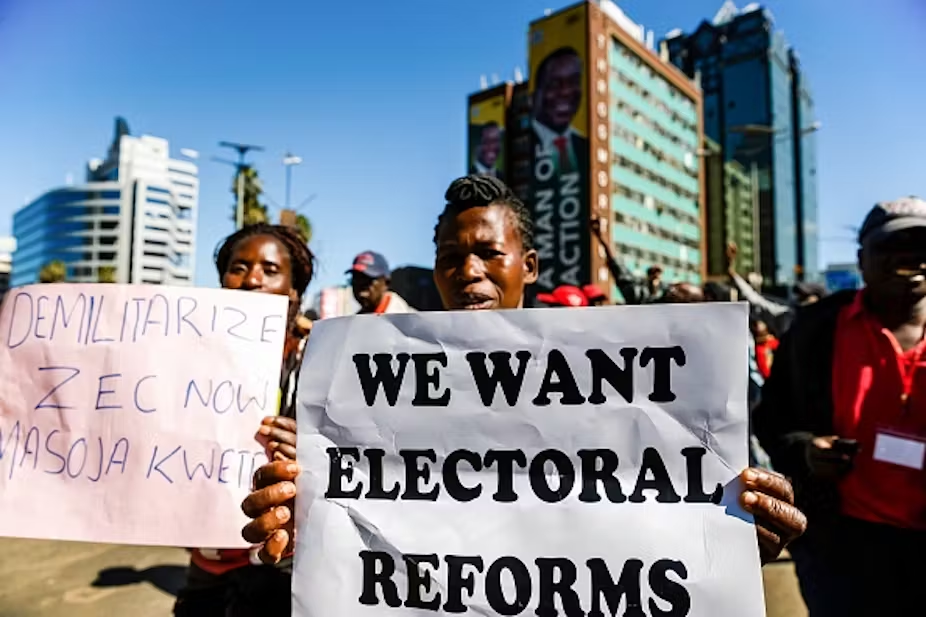
David B Moore is a professor of Development Studies at the University of Johannesburg. He has been researching and writing about Zimbabwe’s political history and political economy Zimbabwean politics since the mid-1980s. His new book Mugabe’s Legacy: Coups, Conspiracies, and the Conceits of Power in Zimbabwe, was released in mid-2022.

Few were surprised as, near midnight on 26 August, the Zimbabwe Electoral Commission announced incumbent president Emmerson Mnangagwa’s reelection in yet another of Zimbabwe’s tendentious contests. His inauguration on 4 September sanctified his return to power.
Fewer still were shocked when South Africa’s president, Cyril Ramaphosa, attended Mnangagwa’s inauguration regardless of the Southern African Development Community (SADC) election observation team’s critical report and the absence of most of his peers from the SADC and the African Union.
Mnangagwa gained 52.6% of the 4,561,221 votes cast. Nelson Chamisa, head of the main opposition Citizens Coalition for Change (CCC), garnered 1,967,343 or 44%. Zanu-PF’s 136 of parliament’s 210 seats is just under the two-thirds needed to change the constitution.
I’ve observed and written about all Zimbabwe’s elections since 2000, when Zanu-PF first faced strong opposition from the Movement for Democratic Change (MDC) under Morgan Tsvangirai. My book Mugabe’s Legacy: Coups, Conspiracies, and the Conceits of Power in Zimbabwe covers nearly 50 years of Zanu-PF’s propensity to gain power by any means – even genocide.
This election displayed many of these patterns. However, each election has registered variations as Zimbabwe hovers between open democracy and fully shut authoritarianism. Zanu-PF’s score, with contemporary variants, ranges from pre- and post-election intimidation to electoral “management” and playing off its regional neighbours. The CCC and civil society choirs also shift their tone in response: from outright rejection and court challenges to pleas for reruns and transitional governments.
Long-term, immediate and post-election intimidation
The post-2017 coup period foreshadowed many of Zanu-PF’s contemporary strategies. First was the soldiers killing at least six demonstrators (and bystanders) just after the mid-2018 elections. In January 2019, a “stayaway” kicked in just after Mnangagwa announced a 150% increase in fuel prices. Planned chaos ensued as riots, looting and protests were encouraged by a multitude of unidentified forces. More than 17 people were killed. As many women were raped. Nearly 1,800 other bodily violations ensued amid mass trials and convictions.
Since then, Zanu-PF has reminded many people not to engage in opposition.
By mid-2020 the targets moved towards women in the MDC. The case of CCC activist Moreblessing Ali’s murder in May 2022 indicates a new variant on “silent murder”. Ali’s brother, Washington, a long-time MDC-CCC activist in the UK, gained the help of CCC MP and lawyer Job Sikhala to publicise his sister’s murder. Sikhala has been imprisoned since his campaign on behalf of Ali.
I examine this horrific assassination in the next issue of the journal Transformation. It illustrates how the move towards land-baron-led gangsterism in Harare connects with Zanu-PF hierarchies of power.
The August 2023 pre-election murder by stoning of CCC activist Tinashe Chitsunge indicated this sort of politics running wild.
After the election, demonstrators and soldiers did not encounter each other en masse: no shootings. However, residents visiting pubs in “high density suburbs” encountered rough treatment from unidentified people with guns and brand-new uniforms. Later, Glen Norah councillor Womberaishe Nhende and fellow activist Sonele Mukuhlani were left naked after their abduction, whipping and injection with poison on 3 September. Their lawyers, Douglas Coltart and Tapiwa Muchineripi, were arrested when visiting them in hospital.
The well-funded “Forever Associates of Zimbabwe” (FAZ) earned its keep by intimidating folks during the pre-election phases. FAZ is a Zanu-PF mix of semi-intellectuals and aspirant entrepreneurs. They are Mnangagwa enthusiasts needing connections to the Zanu-PF state.
They ran illegal “exit polls” at the stations. FAZ’s members, purportedly paid by the Central Intelligence Organisation, kept their promise to “dominate and saturate the environment while denying the same to opponents” – including those within Zanu-PF during its primary nomination contests.
Judicial and electoral ‘management’
The clouds over liberal horizons darkened further in the legal spheres of repression. The “Patriotic Act”, passed ahead of the elections, makes too much opposition-talk with foreigners treasonous. The still unsigned amendment to the Private Voluntary Organisations Bill promises to end all hints of civil society support for opposition parties.
The gerrymandered delimitation exercise remapped mostly urban constituencies so they stretch to peri-urban and nearly rural areas. Zanu-PF hoped the majority would thus support it, as in the countryside. This tactic linked well to election day’s improprieties. Up to 75 urban polling stations experienced unexpected and unprecedented shortages of ballot papers. This caused long and uncertain waits. Some stations extended voting to the next day.
In Glenview, a Harare suburb, hundreds of poor voters walked kilometres to vote by 7am. They waited – peacefully, fortunately – eight hours for the ballot papers.
At other stations, night-time voting added to voters’ roll problems due to the hasty delimitation exercise that left many in the wrong constituency. They were advised to find the correct one.
Where voting continued to 24 August, how many returned?
The V11 forms
Widespread concerns about the V11 forms came on top of worries about the thousands of people giving up on the lost ballot papers. These sheets are posted on the outside walls of the 12,000 polling stations. They show all the votes. They are meant to enable anyone to keep score at the first polling stage. Then the official counting moves on to ward, constituency, and provincial counting centres, and finally to the national “command centre” where the presidential vote is tallied and announced. Suspicion runs rampant about what happens at the links in this chain.
Election NGOs and other organisations were collecting and tabulating images of the V11 forms for digital release. Too late: Zanu-PF conducted on-the-night raids as they were at work.
As the Institute for Security Studies’ southern Africa programme head Piers Pigou noted in conversation with me, if the Zimbabwe Electoral Commission was worried about the election’s legitimacy, the V11 forms would have been on its website immediately. But they are not there – or anywhere.
Regional responses, CCC plans and democracy’s future
As noted, the election observers’ reports do not paint a pretty picture of the election. The Citizens Coalition for Change hoped to exploit the split between the SADC observers and their SADC masters. But the SADC’s council of elders seems unable to help the CCC’s plans to arrange a rerun guided by an international committee. South Africa’s enthusiasm for its neighbour gives little solace to northern democrats. Given Zimbabwe’s courts’ past biases on the legality of elections, the CCC did not bother taking the judicial route.
Mnangagwa’s inauguration has put all those plans to rest. No reruns. No new versions of government of “national unity”, modelled after the disputed, violence-marred 2008 contest, or transitional councils. At most, the election observers’ reports portend further critique. The Zimbabwean democratic forces have to think again, and harder, about ways to a better future.
In sum, if Zimbabwe’s 2023 election foreshadows future battles between authoritarianism and liberal democracy, the former has gained the upper hand. Zanu-PF’S iron fist remains, with a velvet coating, albeit fraying. As a woman overheard discussing this election observed, the only hope may be Zanu-PF destroying itself as it almost did in 2017.
This article is republished from the The Conversation under a Creative Commons license. Read the original article.

 Albano Augustinho Troco is a Postdoctoral Research Fellow under the SA/UK Bilateral Chair in Political Theory. He holds a PhD in Political Studies from the University of the Witwatersrand. His research interests encompass issues on electoral politics, democratization and autocratization studies, secessionist conflicts and international relations.
Albano Augustinho Troco is a Postdoctoral Research Fellow under the SA/UK Bilateral Chair in Political Theory. He holds a PhD in Political Studies from the University of the Witwatersrand. His research interests encompass issues on electoral politics, democratization and autocratization studies, secessionist conflicts and international relations.
